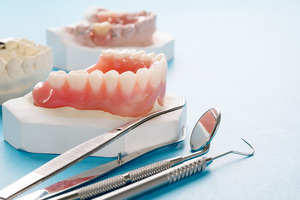
At some point, you may find that your dentures no longer fit as well as they used to, possibly as a result of changes in your jaw or damage to the prosthesis. Ill-fitting dentures may not seem like a major issue on the surface, but if you continue to wear them, they may end up indirectly contributing to a life-threatening problem. Below is a brief look at the unexpected dangers of ill-fitting dentures.
The Link Between Ill-Fitting Dentures, Inflammation, and Oral Cancer
Properly fitted dentures sit snugly on your gums. In contrast, ill-fitting dentures have a tendency to rub against the tissue. Not only can this be uncomfortable, but it can also lead to the tissue becoming inflamed over time.
Inflammation is a natural bodily reaction, but if it turns into a chronic problem, it can have more dire consequences than you might realize. The cells in your mouth can become damaged as a result of the inflammation, and that can potentially increase your risk for oral cancer. This disease is not to be taken lightly; it’s estimated to cause over 12,250 deaths per year, which comes out to an average of one fatality every hour.
Other Consequences of Ill-Fitting Dentures
In addition to possibly contributing to the development of a life-threatening disease, ill-fitting dentures can lead to a number of other problems as well. In particular, they can make it very difficult to chew your food, which may affect your ability to get the nutrition that your body needs to stay healthy. On top of that, they can cause your saliva to pool in the corners of your mouth. This can result in a painful bacterial, yeast, or fungal infection.
What Can You Do About Ill-Fitting Dentures?
As serious as the long-term effects of ill-fitting dentures can be, there’s a simple solution: have them refitted or replaced. If you visit your dentist, they can take a look at your prosthesis and how it fits in your mouth. In some cases, they may be able to solve the problem with a simple adjustment. However, if your dentures are damaged or are very old, your dentist may suggest getting new ones instead.
The key thing to remember is that ill-fitting dentures are more than just a nuisance; they are an active threat to your mouth’s health and ability to function. If you think your dentures no longer fit the way they should, you need to get in touch with your dentist right away. The sooner you can schedule an appointment, the sooner you can look forward to putting the issues of an ill-fitting denture behind you.
About the Author
Dr. Monica M. Mattson studied dentistry at Case Western Reserve in Cleveland, Ohio. Her current practice, Diamond Dental of Owings Mills, offers superior service along with flexible hours. She can help patients with multiple missing teeth re-complete their smiles with beautiful dentures. To schedule a consultation with Dr. Mattson, visit her website or call (443) 394-2273.
